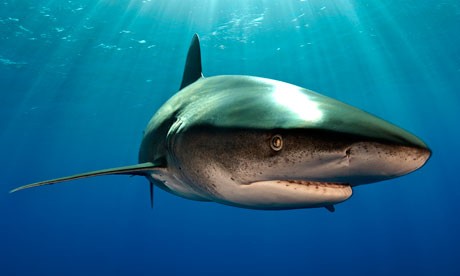A hunt is under way to track down a shark responsible for maiming three Russian tourists in the Egyptian resort of Sharm el-Sheikh, one of whom remains in a critical condition.
Tonight Egyptian officials closed Sharm el-Sheikh's famous beaches and suspended nearly all diving and watersports activities, which attract more than 3 million holidaymakers every year.
Two of the attacks took place within minutes of each other yesterday afternoon, when an oceanic whitetip shark moved close to shore and began snapping at a couple swimming in the Red Sea. The man's legs were torn by the shark and the woman sustained injuries to her legs and back and had to be resuscitated after rescue.
This morning a further attack, believed to be by the same shark, was made on a woman snorkelling on a reef north of the city's Na'ama Bay. Her arms were bitten off, and she was flown to Cairo for emergency treatment. "We are monitoring the situation very closely and working together with all authorities to ensure the safety of all members and visitors in the Red Sea," said Hesham Gabr, chairman of Egypt's chamber of diving and watersports. "Our thoughts are with the victims and their families."
The oceanic whitetip is a common species of shark that can grow up to four metres long, but as its name suggests it is mainly found in deep water. "This event is absolutely extraordinary," Richard Peirce, chairman of the UK-based Shark Trust, told the Guardian. "Since records began in the late 16th century there have been only nine recorded attacks on humans by an oceanic whitetip. It's abnormal behaviour; this shark hasn't just decided to be in the wrong place at the wrong time – there must have been a specific activity or event that brought it there."
Sharks can be sighted frequently in the Red Sea waters around Sharm el-Sheikh, but attacks on humans are rare. There have been some suggestions that fishing vessels have recently started coming closer to the shore.
"Something has brought this animal to the area and made it think dinner, and it's likely that it involves something being put in or on the water," said Peirce. "If fishing vessels have started coming near the beaches and they're discarding unwanted fish over the side, then that's a powerful shark attractant. It could also be camping sites or hotels dumping rubbish, although until further investigations are done none of us can comment intelligently on what the trigger was."
Today a team from the South Sinai national park launched a search for the shark, which they plan to trap and then release in the Gulf of Suez at a safe distance from the shoreline. The Egyptian government will be watching nervously to see whether the incident has any long-term impact on tourism levels, an important source of revenue for the country.
"It won't be just a bump – this is a catastrophe for the local tourism industry," said Ramy Francis, a veteran diver with close knowledge of the area. "Three attacks so swiftly in succession and all of them that aggressive – it will certainly take some time for the hotel and watersports trade to recover."
But Amr Aboulfatah, the owner of a Sharm el-Sheikh dive centre and former chairman of the South Sinai Association for Diving and Marine Activities, disagreed. "Everyone is scared to get in the water right now, but there are concerted efforts going on to resolve the situation and I really don't think we will see any lasting consequences in terms of the tourism industry."

No comments:
Post a Comment